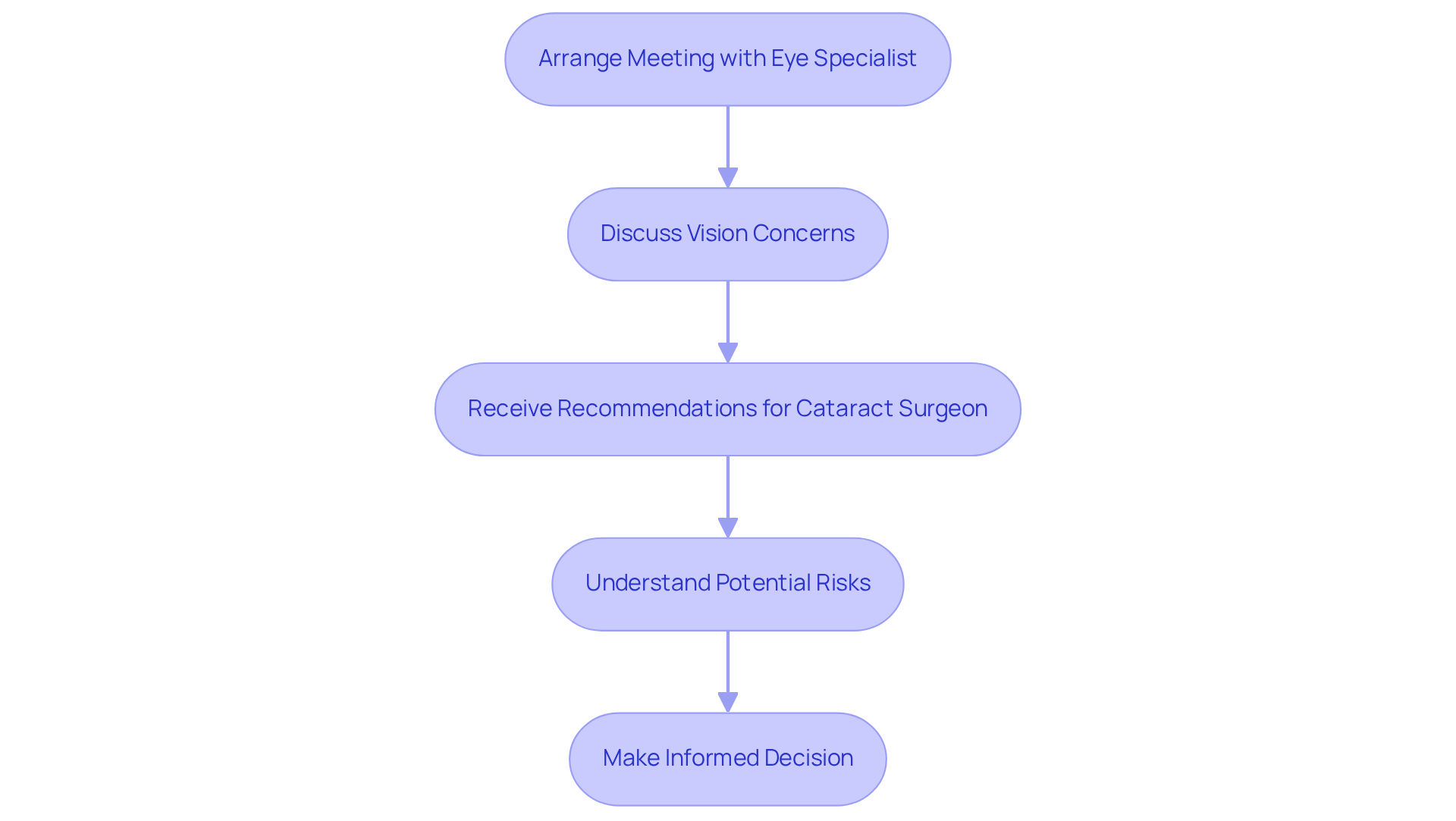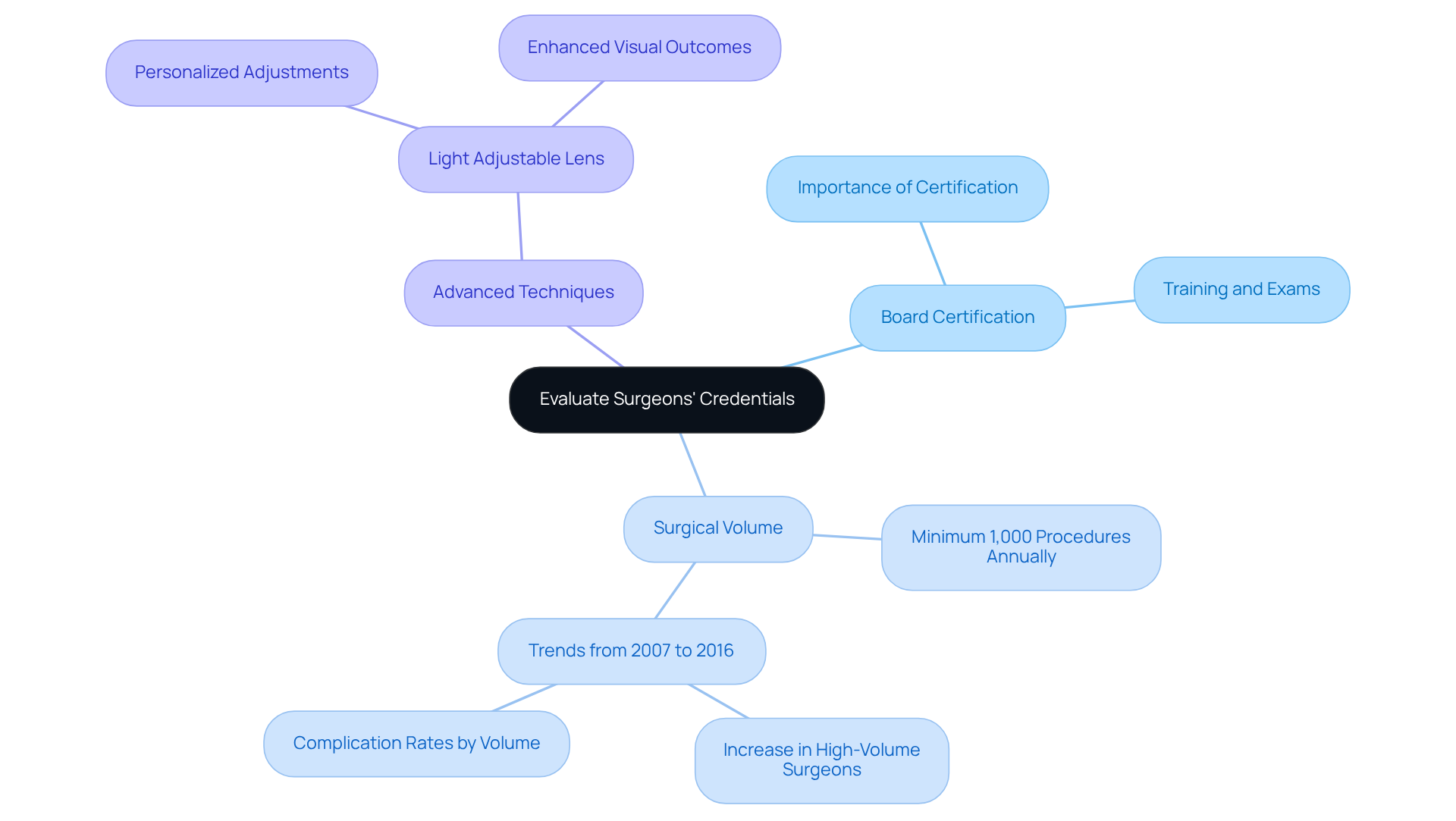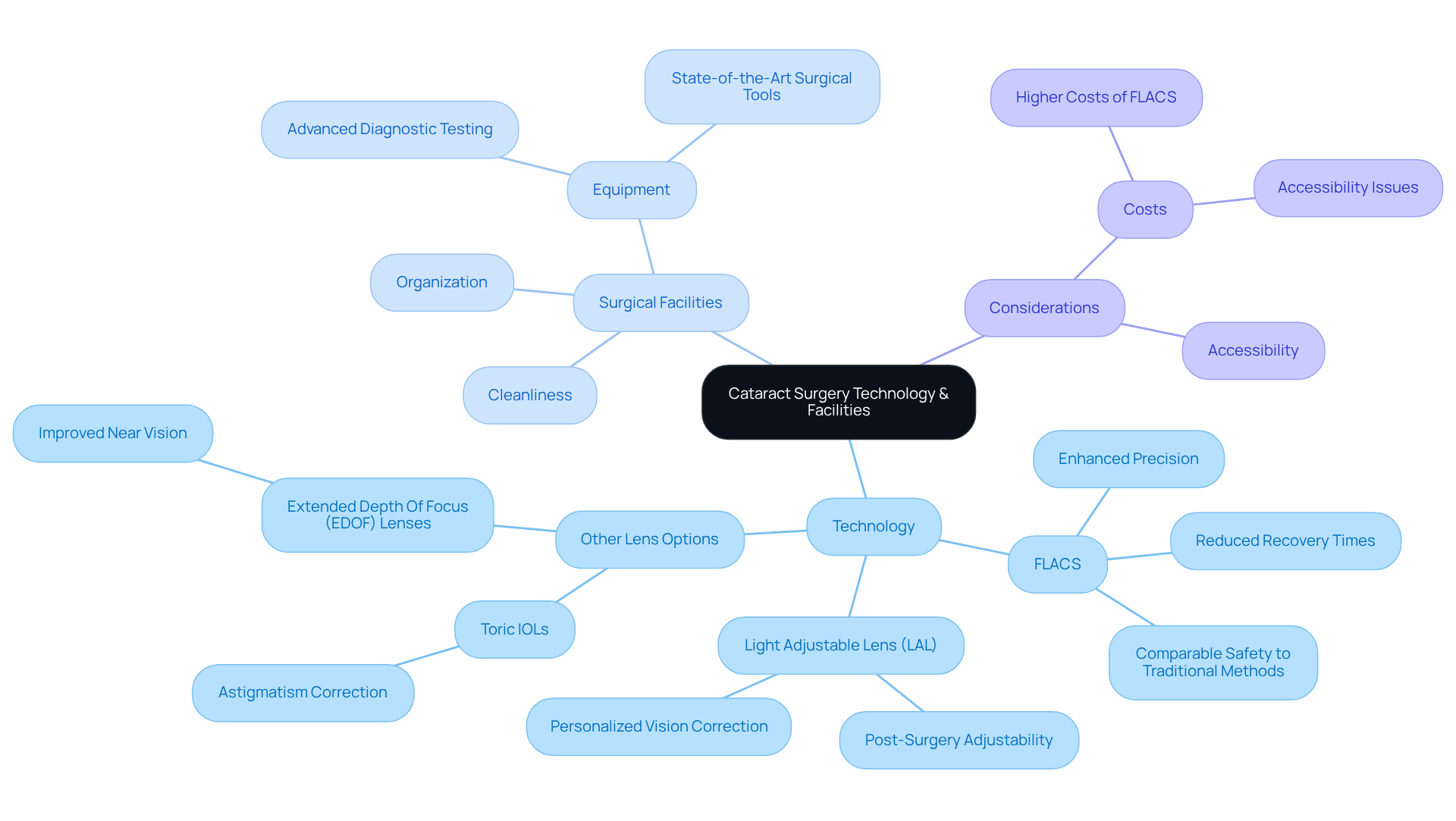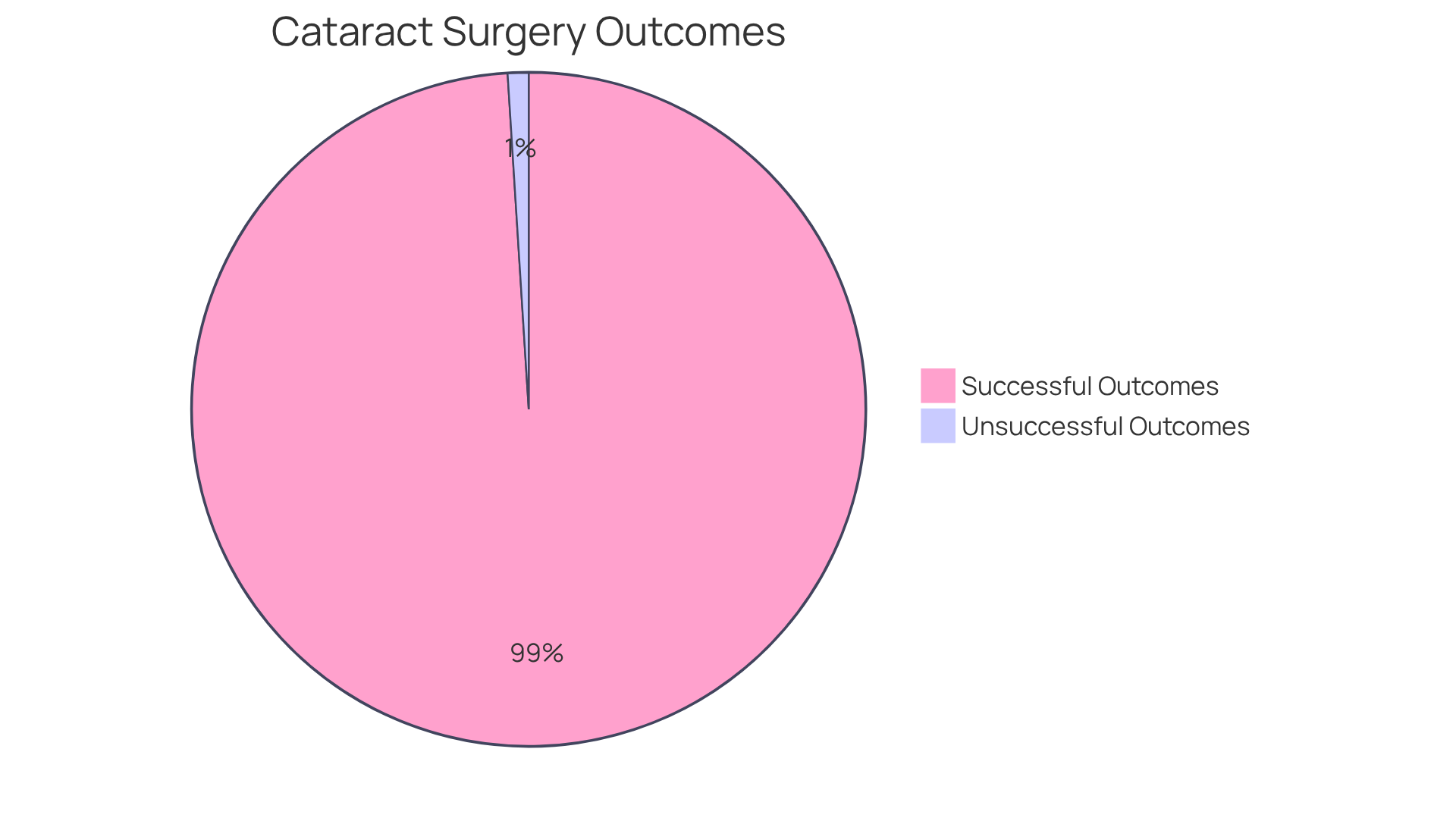Posted by: Northwest Eye in Cataracts, Vision Correction on November 1, 2025
Overview
Choosing the right cataract surgeon can feel overwhelming, and we understand that this is an important decision for you. Start by consulting your eye doctor for recommendations. They can provide valuable insights tailored to your specific needs.
Next, take the time to evaluate the surgeon’s credentials and experience. It’s essential to feel confident in their abilities. Look into the technology they use in their practice, as advanced tools can significantly enhance the quality of care you receive.
Remember, seeking referrals and assessing qualifications can make a real difference in your surgical experience. Understanding the facilities and technologies available will help you feel more informed and secure in your choice.
We are here to help you through this process, ensuring you feel supported every step of the way. It’s common to have questions and concerns, and that’s perfectly okay. You deserve to have all the information you need to make the best decision for your health.
Introduction
Choosing the right cataract surgeon is a vital step in your journey to clearer vision. We understand that with so many options available, it can feel overwhelming. Did you know that nearly 95% of patients see significant improvements after surgery? This statistic highlights just how important it is to make an informed decision.
When evaluating potential surgeons, consider what factors matter most to you. Personal recommendations from friends or family can provide valuable insights, and advancements in technology can greatly influence your surgical outcome. It’s common to feel uncertain, but knowing what to look for can help ease your mind.
This guide will walk you through the essential steps to ensure that your chosen surgeon aligns with your individual needs and expectations. Together, we can pave the way for a successful surgical experience.
Consult Your Eye Doctor for Recommendations
Begin your journey by arranging a meeting with your eye specialist to address any vision worries you may have, including signs of blurred sight. We understand that these symptoms can be concerning, as they might suggest hidden problems like lens opacities or other ocular conditions. During this consultation, your doctor will assess the seriousness of your eye condition and can recommend a skilled cataract surgeon from their professional network.
It’s reassuring to know that studies show almost 95% of individuals experience significant enhancement in visual clarity following lens surgery. This highlights the importance of seeking guidance from your eye doctor. They can provide insights into the various types of intraocular lenses available, including the innovative Light Adjustable Lens, and what to expect during the surgical process.
Be sure to ask for recommendations for a reliable cataract surgeon, as this can greatly simplify your search for a qualified expert. This step is crucial in ensuring you receive the best possible care. As Dr. Mohammad Uzair Zakai observes, ‘Referrals from eye specialists are essential in directing patients to a cataract surgeon, which greatly influences their operative results.’
It’s also important to discuss any potential risks associated with the surgery. We understand that understanding these factors can help you make an informed decision. Remember, you are not alone in this process; we are here to help you through it.

Evaluate Credentials and Experience of Surgeons
When considering a cataract surgeon, we understand that you may have many questions and concerns. It’s crucial to look into their qualifications thoroughly. Board certification in ophthalmology is a vital indicator of a physician’s expertise. This certification means they have completed extensive training and passed rigorous exams, ensuring they are knowledgeable about the latest techniques and standards of care.
Expertise in lens operations is just as important. You might want to ask how many procedures the physician performs each year. Research shows that higher case volumes often lead to better surgical outcomes. For instance, specialists who conduct at least 1,000 eye procedures annually typically see lower complication rates and improved visual results. In fact, the percentage of cataract surgeries performed by high-volume specialists rose significantly from 36.9% in 2007 to 68.1% by 2016, indicating a growing trend towards specialization in this area.
Additionally, professionals skilled in advanced techniques, like the innovative Light Adjustable Lens available at Northwest Eye, are often better prepared to handle complex cases. This technology allows for personalized adjustments after surgery, which can greatly enhance visual outcomes for patients. To learn more about how the Light Adjustable Lens works and to hear insights from specialists, we encourage you to watch our video. Engaging with a cataract surgeon who has a proven track record in eye procedures and is knowledgeable about the latest innovations can significantly improve your chances of a positive outcome.

Inquire About Technology and Surgical Facilities
When you’re considering a cataract surgeon, it’s important to ask about the technology they use in their procedures. We understand that this can feel overwhelming, so don’t hesitate to inquire if they utilize advanced methods like femtosecond laser-assisted cataract procedures (FLACS) or the latest intraocular lenses, such as the innovative Light Adjustable Lens (LAL) available at Northwest Eye. The LAL is a remarkable option that allows for adjustments after surgery, offering a personalized approach to vision correction. This technology can significantly enhance your chances of achieving optimal vision without glasses, making it a vital factor in your decision-making process.
The adoption of FLACS has been steadily increasing, and for good reason. It enhances precision and reduces recovery times, making it a preferred choice among many surgeons. A recent study showed that FLACS provides similar safety to traditional phacoemulsification procedures while achieving significantly better visual acuity results shortly after the operation.
If you can, we encourage you to visit the surgical facility to assess its cleanliness, organization, and overall environment. A state-of-the-art facility equipped with cutting-edge technology, including advanced diagnostic testing and specialized lens options like the Single Distance Astigmatism Package and the Presbyopia Package, not only enhances safety but also contributes to a more comfortable surgical experience. The expertise of the cataract surgeon at Northwest Eye represents a significant advancement in eye operations, leading to improved patient outcomes and satisfaction. Ensuring that your cataract surgeon operates in a modern, well-equipped establishment can greatly influence the success of your eye procedure.
Moreover, with eye surgeries expected to rise by about 10% each year due to demographic shifts, understanding these advancements is crucial for making informed choices. However, it’s also important to consider that FLACS and advanced lens options like the LAL may come with higher costs compared to traditional methods, which could affect accessibility for some individuals. Remember, we are here to help you through this process and answer any questions you may have.

Research Patient Reviews and Success Rates
We understand that choosing a cataract surgeon can feel overwhelming. Taking the time to explore reviews and testimonials from individuals who have undergone similar experiences can be incredibly helpful. Platforms like Healthgrades, Vitals, and Google reviews provide valuable insights into patient satisfaction and experiences. Look for feedback regarding the doctor’s communication style, the thoroughness of pre-operative consultations, and the quality of post-operative care.
It’s common to feel anxious about the procedure, but knowing that high success rates in cataract surgeries are essential indicators of a practitioner’s skill can bring some reassurance. Studies reveal that over 99% of cataract operations lead to enhanced or stabilized vision. Furthermore, client testimonials can unveil individual experiences that emphasize the doctor’s method and efficacy. For instance, many patients, like Mitra Harris and Hayden Beatty, report life-changing outcomes, with satisfaction rates consistently above 90%.
By prioritizing these reviews and success metrics, you can make a more informed choice regarding your cataract surgeon. Remember, we are here to help you through this process, ensuring you feel supported every step of the way.

Conclusion
Choosing the right cataract surgeon is a crucial step toward restoring your vision. We understand that this decision can feel overwhelming, but by consulting with your eye doctor for trusted recommendations, evaluating the credentials and experience of potential surgeons, inquiring about the technology and facilities they use, and researching patient reviews and success rates, you can navigate this important choice with confidence. Each of these steps is vital in ensuring you receive high-quality care tailored to your specific needs.
Start with your eye doctor, who can provide referrals based on their professional network. It’s common to feel uncertain about qualifications, but knowing a surgeon’s surgical volume and the advanced technologies they employ—like femtosecond laser-assisted cataract surgery and innovative intraocular lenses—can help ease your mind. Additionally, understanding patient experiences through reviews offers valuable insights into the surgeon’s communication style and overall effectiveness.
Ultimately, making an informed choice about a cataract surgeon not only enhances the likelihood of a successful surgical outcome but also contributes to your peace of mind throughout the process. As the demand for cataract surgery continues to grow, prioritizing these factors is essential for ensuring a safe and effective journey toward clearer vision. Taking proactive steps now can lead to transformative results and an improved quality of life. We are here to help you through this process.
Frequently Asked Questions
What should I do if I have vision concerns, such as blurred sight?
You should arrange a meeting with your eye specialist to address any vision worries and assess the seriousness of your eye condition.
Why is it important to consult an eye doctor?
Consulting an eye doctor is crucial as they can identify hidden problems, recommend a skilled cataract surgeon, and provide insights into the types of intraocular lenses available.
What can I expect after cataract surgery?
Studies show that almost 95% of individuals experience significant enhancement in visual clarity following lens surgery.
What type of lens options can my eye doctor discuss with me?
Your eye doctor can discuss various types of intraocular lenses, including the innovative Light Adjustable Lens.
How can I find a reliable cataract surgeon?
Your eye doctor can provide recommendations for a qualified cataract surgeon, which simplifies your search for expert care.
What are the potential risks associated with cataract surgery?
It’s important to discuss any potential risks with your eye doctor to make an informed decision about the surgery.
How can I be supported during the cataract surgery process?
You are not alone; support is available to help you through the process of cataract surgery and recovery.






